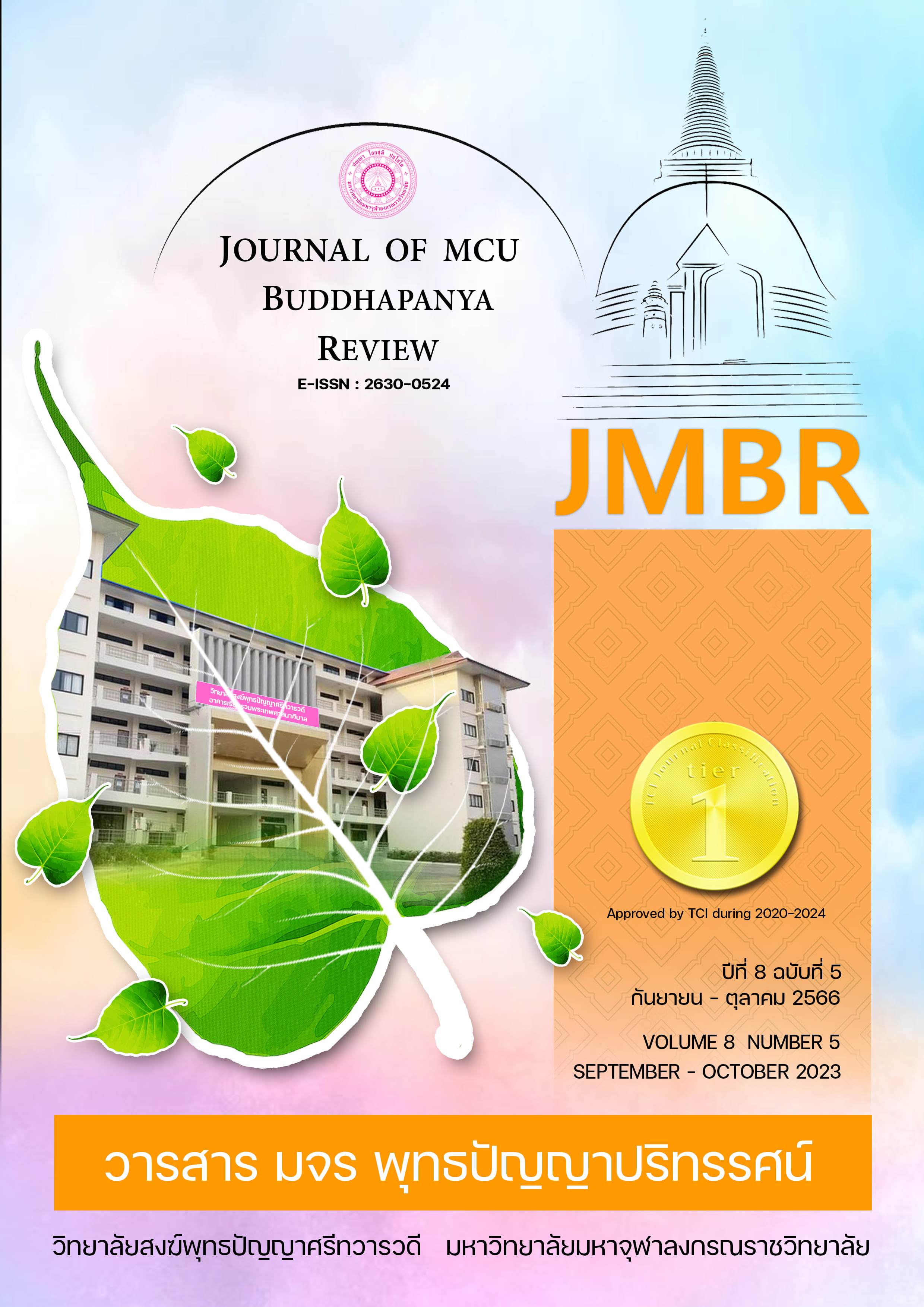การวิเคราะห์ปัจจัยที่มีอิทธิพลต่อการรับรู้การจัดการประสบการณ์ของลูกค้าโรงแรม ในเขตพื้นที่พัฒนาการท่องเที่ยวฝั่งทะเลตะวันตก
คำสำคัญ:
การวิเคราะห์องค์ประกอบเชิงยืนยัน;, การจัดการประสบการณ์ของลูกค้า; , การท่องเที่ยวฝั่งทะเลตะวันตก;, ปัจจัยต่อการรับรู้บทคัดย่อ
การสร้างประสบการณ์ให้แก่นักท่องเที่ยวเป็นส่วนหนึ่งของการส่งเสริมการตลาดการท่องเที่ยวให้แก่ประเทศไทย บทความวิจัยนี้มีวัตถุประสงค์เพื่อวิเคราะห์ปัจจัยที่มีอิทธิพลต่อการรับรู้การจัดการประสบการณ์ลูกค้า กลุ่มตัวอย่างได้แก่นักท่องเที่ยวที่เข้าพักโรงแรมในเขตพื้นที่พัฒนาการท่องเที่ยวฝั่งทะเลตะวันตกทั้ง 4 จังหวัดได้แก่ เพชรบุรี ประจวบคีรีขันธ์ ชุมพรและระนอง องค์ประกอบหลักประกอบด้วย จุดติดต่อการบริการในโรงแรม (TPH) องค์ประกอบประสบการณ์ของลูกค้า (EE) โครงสร้างประสบการณ์ลูกค้า (ES) ส่วนประสมทางการตลาด (MMP) ความเป็นไทย (TN) ปัจจัยการรับรู้ประสบการณ์ลูกค้า (PCEM) ความพึงพอใจ (STF) และความจงรักภักดี (LYT) โดยมีขนาดตัวอย่าง 416 ตัวอย่าง แสดงความสัมพันธ์ระหว่างองค์ประกอบ ผลการวิเคราะห์องค์ประกอบเชิงยืนยัน พบว่า โมเดลการรับรู้การจัดการประสบการณ์ลูกค้าของข้อมูลเชิงประจักษ์ โดย ไค-สแควร์ = 344.35, p = 0.06, df = 294, ค่าสถิติไคสแควร์สัมพัทธ์ ( ) = 1.17, CFI = 1.00, GFI = 0.95, AGFI = 0.91, RMSEA = 0.02 แสดงว่าองค์ประกอบต่าง ๆ สามารถอธิบายความแปรปรวนในการรับรู้การจัดการประสบการณ์ลูกค้าได้ โดยพบว่า องค์ประกอบประสบการณ์ (-0.42) จุดติดต่อการบริการในโรงแรม (0.36) โครงสร้างประสบการณ์ (0.33) ความเป็นไทย (0.31) และ ส่วนประสมทางการตลาด (0.06) สามารถส่งผลต่อการรับรู้การจัดการประสบการณ์ลูกค้าโรงแรมในเขตพื้นที่พัฒนาการท่องเที่ยวฝั่งทะเลตะวันตก
เอกสารอ้างอิง
A.R.Walls, et.al. (2011). An epistemological view of consumer experiences. International Journal of Hospitality Management. Volume 30, Issue 1, March 2011, 10-21.
Pongtratik, C. et al. (2021). The Development of Cultural Tourism Strategies in Prachuap Khiri Khan Province. Journal of MCU Buddhapanya Review, Vol. 6 No. 3.
Khanom, C. (2020). Marketing Mix (7Ps) for Service Business that Affect Service Satisfaction Case Study Siam Commercial Bank Pub Co., Ltd., Khao Peep Branch, Chumphon Province. Ramkhamhaeng University: Journal of Public Administration, Faculty of Political Science.
Jangjanjit, C. (1994). Customer Experience Management Strategy. Bangkok: Eureka Publishing Co., Ltd.
Department of Industrial Promotion. (2018). Creative Industry Village: CIV. E-journal. dip. Vol.60 No. July – August 2018. Bangkok: Department of Industrial Promotion.
Government Saving Bank (2019). Hotel Business: Industry Update GSB Research. Service Economic Analysis; Unit Sector Economy; Bangkok: Government Savings Bank Research Center.
Gilmore and Pine. (2002). Customer experience places: The new offering frontier. Article in Strategy and Leadership. August 2002.
Hair J.F., Black W.C., Babin B.J., Anderson R.E. & Tatham R.L. (2006). Multivariate data analysis. (6th ed.). Pearson Prentice Hall: New Jersey.
Heibronn (2009). Customer Experience Management in the Hotel Industry. MA European Tourism Management, Bournemouth University.
Industry Inside. (2019). Amadeus and IHG research 3 Future Trends of Hotel Business in Thailand. Marketing Oops: July 4, 2019.
Wanichbancha, K. (2014). Structural Equation Analysis (SEM) with AMOS. Bangkok: Samlada Co., Ltd.
Lars Gronholdt, Anne Martensen, Stig Jorgensen, Peter Jensen. (2014). Customer Experience Management and Business Performance. 17th QMOD-ICQSS (1-16). Prague, Czech Republic: Linkoping University, Lund University.
Ministry of Tourism and Sport. (2015). Thainess. Retrieved from tatpr.org: http://www.tatpr.org/webdatas/files/
M.L.Kathathong Thongyai. (2018). Look Back Think Beyond Demark Show 2018. Thaitimenews.com, 25 May 2018.
Chaowiang, N. (2018). Perception of Customer Experience Management of Medium-Small sized Spa Business. The Journal of Pacific Institute of Management Science (Humanities and Social Sciences): 164 -179 Vol.4 No.1.
Office of the National Economic and Social Development Council. (2019). Report on the Results of National Development in the Past 5 years (2014 – 2018). Bangkok: Office of the National Economic and Social Development Council.
Office of the Permanent Secretary; Ministry of Tourism and Sport. (2017). Master Plan for Tourism Development in the West Coast Tourism Development Zone (The Royal Coast หรือ Thailand Riviera) 2017 – 2021. Bangkok: Ministry of Tourism and Sport.
Timdaeng, P and Panchakajornsak, W. (2011). Experience Marketing Model for Foreign Tourists. Journal of the Association of Researchers. 89 – 101 Vol.16 No.3.
Jarusan, P et al. (2014). Customer Experience Management of Thai Research University Libraries. Journal of Library and Information Science Srinakharinwirot University. 23-35 Vol.7 No.2.
Phramaha Teerawat Sesapunyo (Sanyattitat). (2022). Model of Cultural Tourism for Local Government Organizations in Chiang Rai Province. Journal of MCU Buddhapanya Review, Vol. 7 No. 2.
Prashant Chuahan, Sammar Sarabhai. (2018). Customer Experience Management Evolution and the Paradigm Shift in Marketing. Business Perspectives, 18-34. Vol. 17 No. 1
Rattanapong, S. et al. (2021) Community Based Tourism Manament in WANG Thong Subdistrict, Wang Thong District, Phitsanulok Province. Journal of MCU Buddhapanya Review, Vol. 6 No. 1.
Sangsuwan, T. et al. (2009). Marketing Management. 10th edition. Bangkok: Pearson Education, Indochina Co., Ltd.
Tourism Authority of Thailand: TAT. (2018). Amazing Thailand Tourism Year: Annual Report 2018. Bangkok: Tourism Authority of Thailand.
ดาวน์โหลด
เผยแพร่แล้ว
รูปแบบการอ้างอิง
ฉบับ
ประเภทบทความ
สัญญาอนุญาต
ลิขสิทธิ์ (c) 2023 วารสาร มจร พุทธปัญญาปริทรรศน์

อนุญาตภายใต้เงื่อนไข Creative Commons Attribution-NonCommercial-NoDerivatives 4.0 International License.



